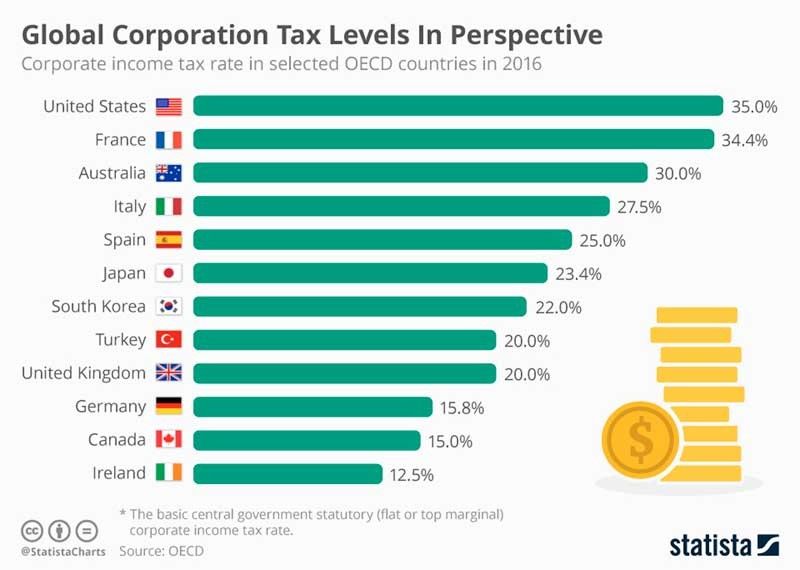
This chart shows corporate tax rates by country in 2016 prior to the Trump tax cut.
The polarization of the American electorate has seemingly become every political writer’s “go-to” topic these days. It’s all doom and gloom. As David French writes in his recent article for The Atlantic: “When even good-faith voices find themselves so diametrically, emotionally opposed — unable to step into the other side’s shoes — then we know the polarization and division are deeply embedded into the current American DNA.”
It’s all negative. It’s all about how neither side can even acknowledge the other might have a point. It’s digging in and insulting those who don’t think the way we do. The middle seems to have all but disappeared.
Throwing mud from one side to the other won’t solve the real problems we face. Insulting, even threatening, one another won’t fix our woes or put more money into our bank accounts. It’s time to find middle ground again. Time to see the other side “isn’t nuts,” and can have valid points. It has to start with each of us looking in the mirror and finding an open mind to compromise, to seek middle ground, to listen to those we don’t agree with. So let me start with myself.
I have voted Republican most of my life. I voted in my first election, in 1984, for Ronald Reagan. I voted Republican in every subsequent election until 2008, when I voted for Obama. I had, and have, deep respect for John McCain. I would have been very happy with McCain winning in 2008. But as a believer in the power of diversity, I wanted to take a different path. I voted Democratic for the first time.
In 2016, I did not vote for Trump. I also did not vote for Hillary. Wasn’t a fan of either. I voted for a third-party candidate for the first time in my life.
I am still not a Trump fan. But I have many friends and family who are strong supporters. Many smart and wise people who love him and what he is doing. They can’t all be “nuts” and ignorant, and they certainly are not. So even if I am not a fan, the man is still my president. So, let’s step back and be objective.
There is no doubt Trump has done some good things. Nobody can be 100 percent wrong or 100 percent bad. While some on the left paint everything he has done with a negative brush, this isn’t going to help diffuse the gridlock. Let’s take an objective look. And from the lens I am looking through, Trump has had three irrefutable wins in his two years as president, which is a pretty good score when compared to past presidencies:
He got elected. As a marketer by training, I believe every single marketer should study the Trump victory — because it is a lesson on how to win with a brand.
We are all, as individuals, brands. All of us have brand equity and a brand image in the minds of others. Politicians are certainly brands, and they seek to craft a very clear image in voter’s minds.
Brands have two choices to win. The first is going for a broad target (voters, in this instance) and thus having a more general message that doesn’t turn anyone off. It’s about making your brand okay with voters. Liking versus loving. The brand is happy to be “just liked” and happy to be “okay” in people’s minds.
The second choice is to be like Harley-Davidson. You don’t try to be a mass-market brand, you have a quite specific image and you appeal to a narrower niche of people. But within this niche, people don’t just like you; they love you. It goes far beyond brand satisfaction, to a world of brand delight. It’s a different strategy and may result in less people under your tent, but those who are in your tent are fiercely loyal and won’t be so quick to jump ship.
Trump carved out a core target of 30-35 percent of the US population, and he appealed to them. He didn’t soften his message to try and bring more people under his tent. He didn’t flip-flop to try and broaden his base. He didn’t mince words and soundbite every message to ensure it was okay. No, he went for delighting this 30-35 percent of voters. And they showed up for him at the polls and stand by him today through thick and thin. It was a brilliant campaign strategy and there is much any marketer can learn from this. It is always better to delight 30 percent of people than get greedy and go generic to make 50 percent like you.
He slashed the US corporate tax rate. Many of my liberal friends will say, “Trump cut the taxes for rich companies at the expense of the common citizen,” and this is a quite shortsighted view that misses the big picture. Cutting the corporate tax rate was long overdue and a good move that will feed the US economy for generations.
Companies are owned by shareholders who want a return on their investment. This return is fueled by profits. There is nothing wrong with making a profit. It’s not evil. It’s a necessity to staying in business!
Corporations create jobs for people. They feed the economy. We should want companies to be healthy so they create more jobs and invest in the economy. We also want the US to be hyper-competitive in attracting new corporate investment: new plants, new offices, new business ventures.
We all live in a global world. Companies have choices. Let’s say you are a US-based global corporation. You are looking to open a new worldwide service center. You want it to be in a developed market, English-speaking. You will create with this new service center 1,000 jobs and provide a huge boost to the local economy.
Now look at the chart accompanying this article, showing corporate tax rates by country in 2016 prior to the Trump tax cut. Where would you put this new investment, knowing you owe it to your shareholders to provide a good return on investment?
You wouldn’t pick the US. You would pick Ireland, perhaps. Corporations have obligations to shareholders, and if you can locate in a country like Ireland and save more than half on your taxes, you will do it. This has nothing to do with patriotism. Companies have to serve shareholder interests. They have to be cost-competitive in a global world.
The new US corporate tax rate is now a more competitive 21 percent. And as you can see on the table, this puts the US into the “sweet spot” and very competitive with other leading nations. This means the US gets more corporate investments, more jobs, more reasons to move operations to the US. It was a good decision for Americans.
Trump will likely end up cutting more favorable trade deals that will benefit the US. Many are pulling their hair out over all of the disruptions of Trump. Picking fights with friends. Embracing enemies. And challenging every single trade agreement and demanding renegotiation! And even picking a fight with China and triggering a trade war of sorts.
Relax. It’s just Trump.
He’s an antagonist. A disruptor. He likes to keep people off balance. He’s a negotiator and always looking for a deal. He is full of bluster and noise meant to stir things up. His bark is worse than his bite! And it usually works. Most people thrive on order, and Trump thrives in chaos. So when he makes things chaotic, well, it gives him a competitive edge!
Already NAFTA has been renegotiated after all the fighting and threats, and it is indisputably a better deal for the USA. Odds are, China and other trade deals will also end up better for American consumers. And the worry about our long-term relationship with strategic partners? It’s a mere blip on the screen. Couples fight and make up. Friends fight and make up. And nations can have spats and make up. While perhaps a bit disconcerting, in the long run NATO and other strategic alliances will weather the storm.
Like Trump or hate Trump, it’s a personal decision. But one has to objectively admit he has done these three things well.
There is, of course, the bigger question of character. Does character matter for a US president? I have always thought moral authority was the backbone of great leadership. But perhaps the world is shifting. Many in Trump’s base do seem very willing to forgive his transgressions, on the basis that they love what he is doing so much they don’t care what he does otherwise. Trump famously said, “I could shoot someone on Fifth Avenue and my supporters would remain loyal,” and he is frankly spot-on.
For many Trump voters, the end justifies the means. As long as he does what they want, they will ignore or rationalize the myriad of character issues that arise. For many liberals, the end never justifies the means. The character questions matter. A great deal.
People are allowed to have varying views. “The end justifies the means” is a proven route to deliver outcomes. It is, however, a slippery slope and history would show the pursuit of this path does often leads to ruin. But this is a subject for another day and another column.
Trump has achieved some impressive results. And if the liberal opponents want to engage in a character debate, they should start with finding the middle ground and acknowledging this fact: Like him or not, Trump has made some good moves.
